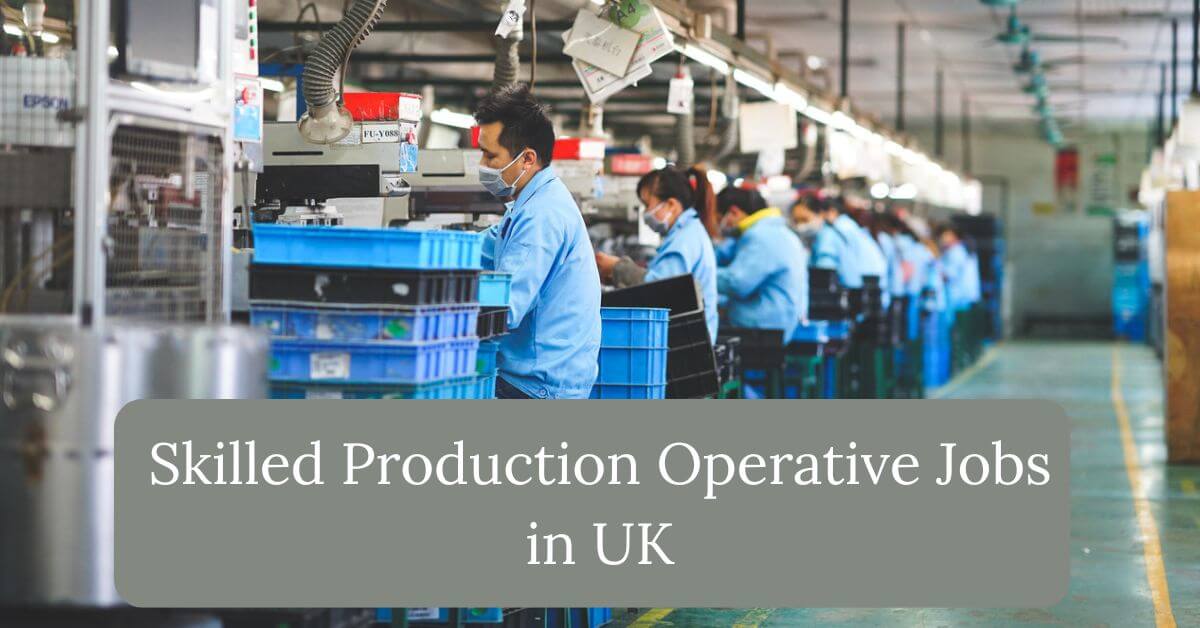Skilled Production Operative jobs in UK are a great chance to get a hands-on job that could lead to more opportunities. These full-time, on-site jobs pay between £18,000 and £25,000 a year, which is a good amount of money and a good way to move up in your work.
People who are driven and eager to learn and contribute are also welcome, even if they don’t have experience in manufacturing or production. With visa sponsorship, this is a chance to build a stable and rewarding job in the UK while working in a fast-paced and helpful space.
Why is there a Demand for Skilled Production Operative Jobs in UK?
The need for skilled production operator jobs in the UK is driven by several factors:
- Growth in the Manufacturing and Production Sector: The need for skilled workers to support production is growing as the UK’s industrial sector expands, particularly in sectors like food processing, automotive, and pharmaceuticals.
- Emphasis on Quality Control and Efficiency: High-quality manufacturing processes are becoming more and more important to businesses, and they need skilled workers to make sure that standards are upheld and that production proceeds smoothly.
- Shortage of Skilled Labor: Since there is a labor shortage in the UK and many manufacturing roles call for specialized skills and technological expertise, UK firms are turning to foreign talent and sponsoring visas.
- Adoption of Advanced Machinery and Technology: As automation and machine operation technology improve, businesses want competent workers who can efficiently operate and maintain contemporary machines.
Types of Skilled Production Operative Jobs:
In the UK, skilled manufacturing worker positions differ depending on the sector and the particular tasks required. In the UK, common skilled production operator jobs include:
- Machine Operator: Production machinery is managed and observed by machine operators, who also diagnose problems and perform necessary maintenance.
- Assembly Line Worker: Workers in assembly lines use a variety of tools and adhere to stringent quality standards to precisely assemble items, such as electronics or auto parts.
- Quality Control Inspector: Throughout the production process, quality control inspectors keep an eye on the final goods’ quality, spotting and reporting any flaws or irregularities.
- Packaging Operative: Packaging operatives handle product packaging, ensuring items are correctly sealed, labeled, and prepared for distribution.
- Maintenance Technician: In order to guarantee peak performance and avoid malfunctions during production, maintenance experts conduct routine inspections on production equipment.
Salary Expectations:
Depending on the sector, level of expertise, and duties, production operator positions in the UK pay attractive yearly wages, usually between £18,000 and £25,000.
- Entry-Level Production Operatives: Entry-level positions, such as those in packaging or assembly lines, often start at between £18,000 and £20,000 annually, with the possibility of overtime compensation and performance-based bonuses.
- Experienced and Specialized Production Operatives: Skilled workers can make up to £25,000 a year, with opportunities for promotion in major organizations, especially if they have technical skills in quality control or machine maintenance.
Read Also: Production Operative Jobs in UK With Visa Sponsorship
Job Responsibilities:
Supporting and overseeing different phases of the production process is the responsibility of skilled production workers. In the UK, skilled production operator jobs typically involve the following duties:
- Operating and Maintaining Machinery: To guarantee steady production output, skilled workers run production equipment, carry out regular inspections, and make minor repairs.
- Assembling and Packaging Products: Workers in assembly and packaging adhere to protocols to assemble goods, precisely package them, and get them ready for delivery or additional processing.
- Conducting Quality Checks: By spotting flaws and making sure the finished goods follow safety and legal requirements, quality control inspectors make sure products fulfill quality standards.
- Managing Inventory and Supplies: To guarantee that manufacturing lines have the supplies they need, skilled workers monitor inventory levels, handle raw materials, and interact with supervisors.
- Reporting and Documentation: In order to increase overall production efficiency and quality, operators keep track of production operations, equipment performance, and any problems that arise.
- Following Health and Safety Guidelines: Production workers use protective gear, implement industry-specific safety procedures, and abide by stringent health and safety laws.
Requirements:
Candidates must fulfill specific educational and skill requirements to be eligible for skilled production operator jobs in the UK with visa sponsorship:
- Technical Skills in Machine Operation or Quality Control: Production positions greatly appreciate the ability to use tools, operate machines, and conduct quality control inspections.
- Basic Education or Vocational Training: Although a high school degree or its equivalent is normally necessary, certain positions, such as those involving the operation or maintenance of machinery, may benefit from further vocational training or certificates.
- Attention to Detail: To guarantee product uniformity and safety, quality control, packaging, and assembly positions require accuracy and close attention to detail.
- Physical Stamina and Manual Dexterity: Production workers need to be physically active and have good manual dexterity because they frequently touch machinery, stand, and perform repetitive jobs.
- Work Visa Eligibility: Generally speaking, foreign applicants for production worker positions in the UK need a skilled worker visa. Companies that sponsor visas help with the application process, including obtaining the required paperwork, which may include a valid passport, evidence of employment, and, if required, medical documents.
Benefits of Jobs:
- Competitive Salary: Generally speaking, skilled production workers make more money than unskilled workers, and their pay may rise in response to their performance and experience.
- Work Stability: Long-term work stability in the manufacturing and production industries through permanent positions with respectable firms.
- Training & Career Development: Companies frequently offer training programs that help you grow professionally, acquire new skills, and maybe rise into more senior positions like managers or supervisors.
- Training & Career Development: Companies frequently offer training programs that help you grow professionally, acquire new skills, and maybe rise into more senior positions like managers or supervisors.
- Employee Benefits: Provide you and your family with peace of mind by providing access to paid time off, health benefits, pension plans, and social security contributions.
- Overtime Pay: Many production positions include overtime, which can greatly boost wages for employees who are prepared to work longer hours.
- Work Experience: Get useful practical experience in the manufacturing and production sector, which may lead to new work prospects in the UK or overseas, or career progression.
- Social and Cultural Experience: You can enhance your English language proficiency, build a worldwide professional network, and experience British culture by living and working in the UK.
- Career Advancement: Production workers frequently have the chance to advance within the organization to more responsible positions, such as technical or supervisory ones.
- Flexibility: To support individual requirements or work-life balance, certain jobs provide flexible work schedules or shift patterns.
Conclusion:
In the UK, skilled production operator positions provide international candidates with a great chance to join the expanding manufacturing industry. These jobs, which call on technical proficiency, meticulousness, and physical endurance, offer competitive pay as well as chances for professional growth. In order to assist employees in advancing in their careers, companies frequently provide training programs, and the availability of visa sponsorship allows for the recruitment of talent from abroad. Skilled production operator positions may be the ideal route for you if you’re searching for a rewarding career in the manufacturing and production sectors of the UK.
Frequently Asked Questions:
What qualifications are needed for a skilled production operative role in the UK?
Most positions require basic education and relevant experience in manufacturing or production; some roles may need specific technical skills.
Is visa sponsorship available for international applicants?
Yes, many UK employers offer visa sponsorship for skilled production operatives, especially if there is a shortage of local candidates.
What is the average salary for a skilled production operative in the UK?
Salaries typically range from £11 to £16 per hour, depending on experience, location, and employer.






